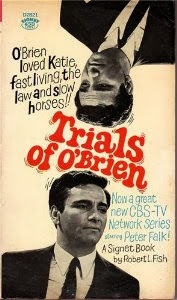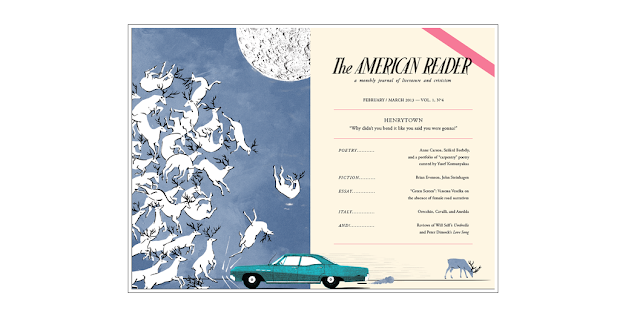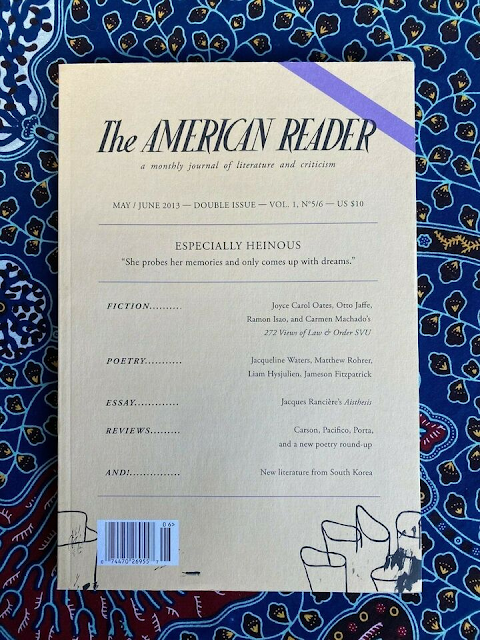Wednesday, January 31, 2024
SSW: Fred Chappell's 3 (earliest published?) short stories, in Robert Silverberg's SPACESHIP, April 1952, April and October 1953: Short Story Wednesday
Sunday, January 21, 2024
THE TRIALS OF O'BRIEN--the television series (and film)--episodes online at the moment:
An episode which won scripter David Ellis the Writers Guild of America award for best episodic drama script in 1966.
Not available on YouTube. Archived at the University of Georgia (the Walter J. Brown Media Archives) in two parts:

.jpg)
Friday, January 19, 2024
FFB: Randy Johnson on THE TRIALS OF O'BRIEN by Robert L. Fish (Rediscovered)
Reviewed in the United States on January 9, 2014
O'Brien gets unwittingly involved in a scheme by an old client of his.
O'Brien gets suckered by Benny's wife into being at a bar late one
Thinks go wrong and there's a dead body. Benny's parole officer had
Our lawyer is forced to defend his former client, who swears the man
Robert L. Fish wrote this one and is the reason I gave it a try.
Wednesday, January 17, 2024
SSW: Joyce Carol Oates: "Sex with Camel"; Carmen Maria Machado: "Especially Heinous: 272 Views of LAW AND ORDER: SVU": THE AMERICAN READER, May/June 2013, edited by Uzoamaka Maduka: Short Story Wednesday
Monday, January 15, 2024
THE AMERICAN READER: 2012-2015 (10 issues) and some web content: edited by Uzoamaka Maduka; Monday Fiction Magazine #1
The American Reader was an ambitious project, perhaps even the equivalent of post-grad work for its principals, very much including the founding editor-in-chief and chief public face of the magazine, the (at founding) 25-year-old Ms. Uzoamaka "Max" Maduka, a Nigerian-American who was interested in demonstrating that there was a market among her generation of readers for relatively sophisticated literary work, but not afraid of a sales pitch leaning into would-be glamor, perhaps a fair amount of the latter driven by fund-raising necessity but perhaps also due to the desire to be On the Scene in NYC-based publishing and overlapping communities...the kind of social whirl around magazines ranging from The Paris Review to National Review (only presumably without the CIA connections and/or funding both of those had early on), and seeking the kind of stability that, say, Harper's had achieved through its institutional heir publisher. The subtitle on the cover of the first year+'s issues was "A Monthly Journal of Literature and Criticism"--it managed two monthly issues in its slightly longer than two-year run; it went to "A Bimonthly Journal...", also a schedule they couldn't maintain. But, then, essentially no one has been able to jump into the market in the last half-century or so with a monthly literary magazine...even the hardiest examples have tended to start with quarterly or bimonthly publication, and presumably with more capital on hand in most cases (and this includes the theoretically "more commercial" fiction magazines in fantastic fiction and crime fiction, where the long-running titles are mostly bimonthly these years and often were introduced, even back in the 1940s as well as in the '70s, as quarterlies). And the issues I've seen were ad-free, except for a very few house ads (touting subscriptions and their website, which featured some extra content at times).
I picked up at least a couple/few issues of the magazine during its run. I never saw the first issue, the only one in saddle-stapled format--see photo of the stack below--and with a cover stock that was easily crumpled; the balance of issues were "perfect-bound" (with glued signatures) and with a heavier stock; the new cover format was patterned (notes Amy O'Leary in New York Times coverage linked at the bottom of the post) after a French political journal, Le Contrat Social, with illustrations soon added with the flavor of another 1950s inspiration, the work of art director George Salter at the Mercury Press magazines such as The American Mercury, Ellery Queen's Mystery Magazine, The Magazine of Fantasy and Science Fiction and their Mercury Mystery and other newsstand periodical book lines, packaged and sold similarly to their magazines.
The one issue I've recently turned up in my reorganization of my library is the May/June 2013 issue (still in the "monthly" subtitle era!), so I'll provide an index and links to the American Reader web archive of those contents as I find them (the site Really Could use a search function, at least).
Maduka, upon the folding of her magazine, had already joined the board of Lapham's Quarterly, and subscription fulfillment for her magazine was offered with issues of that magazine, which (as it happens) officially folded late last year.
What remains of the TAR website; TAR's pretty good Facebook "wall"...which has been abandoned, and thus has some porn spam in comments on late posts, but still has many interesting links--and is the closest thing to an index the site has.
Karen Joy Fowler interviewed by Carmen Maria Machado
 |
| The first issue, October-November 2012 |
Wednesday, January 10, 2024
SSW: MIDNIGHT GRAFFITI edited by Jessica Horsting and James Van Hise (Warner Books 1992); THE WAYS WE LIVE NOW: CONTEMPORARY SHORT FICTION FROM THE ONTARIO REVIEW edited by Raymond J. Smith (Ontario Review Press 1986): Short Story Wednesday
Anthologies from two of the more notable little magazines of their era; OR having lasted a third of a century, and this, the only anthology from it so far, drawing on its first dozen years, the magazine ending with the death of its editor and co-publisher Raymond Smith, as cofounder and widow Joyce Carol Oates chose not to continue it. MG having been more of a mayfly in the horror small press, but having gathered an impressive roster of contributors, with the editors and publisher continuing their writing careers afterward, if perhaps not robustly (not sure if their romantic/domestic partnership continues, another parallel); the book apparently includes reprints from the magazine and fiction perhaps still in inventory after the last issue of the initial run was published in 1992, or solicited for the book--with one story already a reprint when published in the magazine, and another possibly resold to Pulphouse after MG's long delays in publishing (two more issues, one a 1994 "special" and the 1997 other one apparently mostly nonfiction, sporadically followed the book's publication); for its part, the OR book includes a Margaret Drabble story (and not a hundred-word vignette) published two years before in the UK edition of Cosmopolitan, but not previously in North America. Both books rather neglected, even at time of release, with only two editions each...hardcover and apparently trade paperback editions of the Smith volume released by OR Press, and a mass market paperback original release from Warner Books and a Doubleday Book Clubs edition in hardcover for the MG volume. In their introductions, Raymond J. Smith and Jessica Horsting go out of their way to note how very much concerned with the world of today the fiction in their magazines has tended to be, perhaps even more so than that of most comparable magazines in the eclectic literary magazine and the horror and suspense fields (both magazines with dollops of satirical and other sorts of fantasy included), with these selections perhaps highlighting that tendency, which might even be why they seemed a good pair for an essay about just that (Raymond Smith even revising Trollope's novel's title to fit his anthology's tendencies); it's not as if, say, Conjunctions nor Whispers was oblivious to such concerns, but perhaps not quite as intent on being attuned to them. Also notable is the degree to which talented writers, from those who never need worry where their next meal was coming from to rather new and usually promising professionals, would place work with the magazines which presumably paid modestly if at a reasonable going rate. Smith is relatively restrained in presentation, running the stories alphabetically by author, and offering only brief contributor notes in the last pages, including the datum that Oates "helps edit" OR; Horsting is more intent on curation, breaking stories into themed batches, each with a brief introduction by her; each story also has an uncredited headnote, where perhaps an invisible hand of Van Hise is felt. Also notable is how starkly textual how both books feel, compared to the imagery, illustration, photography or otherwise, their magazines featured in each issue.
- Editors: Jessica Horsting, James Van Hise
- Date: 1992-10-00
- ISBN: 0-446-36307-3 [978-0-446-36307-5]
- Publisher: Warner Books
- Price: $5.99
- Pages: xiv+365
- Format: pb (the US Science Fiction Book Club [and possibly other Doubleday Book Clubs as well] released a hardcover in 1993, shot from the same layout)
- Cover: Martin Cannon (reprinted from the cover of the first issue)
- v • Introduction (Midnight Graffiti) • (1992) • essay by Jessica Horsting
- 1 • It Came from Beyond • group introduction/essay by Jessica Horsting
- 5 • Rainy Season • (1989) • short story by Stephen King • Midnight Graffiti Spring 1989
- 30 • Say Hello, Mister Quigley • (1992) • novelette by J. Michael Straczynski • Pulphouse: A Fiction Magazine September/October 1992
- 52 • Sinus Fiction • (1992) • novelette by Gil Lamont
- 83 • Apocalypso • gi/essay by JH
- 87 • Emerald City Blues • (1988) • short story by Steven R. Boyett
- 106 • Cattletruck • (1989) • short story by Cliff Burns
- 112 • Bad Guy Hats • (1989) • novelette by David J. Schow
- 139 • Graffiti • gi/essay by JH
- 143 • "I Want to Get Married" Says World's Smallest Man! • (1992) • short story by John Shirley
- 162 • Spike Jones and the Reverend Sister Claudine • (1992) • novelette by Rex Miller
- 188 • Bob the Dinosaur Goes to Disneyland • (1989) • short story by Joe R. Lansdale
- 192 • Salvation • (1992) • short story by Lawrence Person
- 195 • Psychos • gi/essay by JH
- 199 • Rant • (1990) • short story by Nancy A. Collins
- 213 • Blue on One End, Yellow on the Other • (1990) • short story by K. W. Jeter
- 223 • The Domino Man • (1992) • short story by Phil Tiso
- 253 • Hell, You Say • gi/essay by JH
- 228 • The New Order: 3 Moral Fictions • (1992) • short fiction by R. V. Branham
- 257 • Murder Mysteries • novelette by Neil Gaiman
- 291 • Heaven, Heaven Is a Place • (1992) • short story by R. V. Branham
- 303 • Where I Shall Dwell in the Next World • (1992) • short story by Harlan Ellison
- 318 • The River Styx Runs Upstream • (1982) • short story by Dan Simmons (Rod Serling's The Twilight Zone Magazine, April 1982)
- 334 • Dark Embrace • (1992) • novelette by James Van Hise
- Details supplied by Dennis Lien, augmented by TM.
- ix · Preface · Raymond J. Smith
- 1 · Molly’s Dog · Alice Adams · ss The Ontario Review 21, Fall 1984/Winter 1985
- 12 · The Man from Mars · Margaret Atwood · ss The Ontario Review 6, Spring/Summer 1977
- 29 · Saving the Boat People · Joe David Bellamy · ss The Ontario Review 21, Fall 1984/Winter 1985
- 45 · Town Smokes · Pinckney Benedict · ss The Ontario Review 25, Fall 1986/Winter 1987
- 58 · My Life as a West African Gray Parrot · Leigh Buchanan Bienen · ss The Ontario Review 15, Fall 1981/Winter 1982
- 69 · At the Krungthep Plaza · Paul Bowles · ss The Ontario Review 13, Fall 1980/Winter 1981
- 74 · The Black Queen · Barry Callaghan · ss The Ontario Review 13, Fall 1980/Winter 1981
- 77 · Homework · Margaret Drabble · ss Cosmopolitan (UK) November 1975; The Ontario Review 7, Fall 1977/Winter 1978
- 84 · Death’s Midwives · Margareta Ekström · ss; translated by Linda Schenck, The Ontario Review 20, Spring/Summer 1984
- 93 · Fruit of the Month · Abby Frucht · ss The Ontario Review 20, Spring/Summer 1984
- 102 · A Pure Soul · Carlos Fuentes · ss; translated by Margaret S. Peden, The Ontario Review 12, Spring/Summer 1980
- 116 · The Harvest · Tess Gallagher · ss The Ontario Review 19, Fall 1983/Winter 1984
- 129 · Some Gifts · Reginald Gibbons · ss The Ontario Review 5, Fall 1976
- 137 · Black Cotton · William Goyen · ss The Ontario Review 17, Fall 1982/Winter 1983
- 144 · Any Sport · William Heyen · ss The Ontario Review 24, Spring/Summer 1986
- 152 · The Mango Community · Josephine Jacobsen · ss The Ontario Review 20, Spring/Summer 1984
- 168 · A Metamorphosis · Greg Johnson · ss The Ontario Review 8, Spring/Summer 1978
- 178 · On This Short Day of Frost and Sun · Maxine Kumin · ss The Ontario Review 5, 1976
- 185 · Baby · Joyce Carol Oates · ss The Ontario Review 23, Fall 1986/Winter 1987
- 199 · Confessions of a Bad Girl · Bette Pesetsky · ss The Ontario Review 23, Spring/Summer 1985
- 209 · Tea Party · Sarah Rossiter · ss The Ontario Review 15, Fall 1981/Winter 1982
- 221 · Shadow Bands · Jeanne Schinto · ss The Ontario Review 23, Fall 1985/Winter 1986
- 235 · Rough Strife · Lynne Sharon Schwartz · ss The Ontario Review 7, Fall 1977/Winter 1978
- 252 · The Girl Who Loved Horses · Elizabeth Spencer · ss The Ontario Review 10, Spring/Summer 1979
- 267 · The Interpretation of Dreams by Sigmund Freud: A Story · Daniel Stern · ss The Ontario Review 24, Spring/Summer 1986
- 273 · Mourning · Robert Taylor, Jr. · ss The Ontario Review 14, Spring/Summer 1981
- 281 · Interviews with Insufficiently Famous Americans · John Updike · vi series
- 281 · The Counselor · vi The Ontario Review 12, Spring/ Summer 1980
- 283 · The Widow · vi The Ontario Review 16, Spring/Summer 1982
- 285 · The Undertaker · vi The Ontario Review 15, Fall 1981/ Winter 1982
- 287 · A Lesson in the Classics · Gloria Whelan · ss The Ontario Review 18, Spring/Summer 1983
- 299 · Contributors · Anon · bi
- The stories: as too often, life has been less cooperative than I'd like in rereading the stories in either volume over the last week, but among those I refreshed my memory of, it's amusing to compare the fantasy stories "My Life as a West African Gray Parrot" by Leigh Buchanan Bienen and "Bob the Dinosaur Goes to Disneyland" by Joe Lansdale (the book never gives him his middle initial); the Buchanan Bienen, by a writer who had been and remains primarily a lawyer (particularly involved with women's rights cases, which informs the story), professor and author of legal volumes, as well as contributor of short fiction and critical essays to little magazines, involves said parrot, being as many non-human animals in the story a karmic? reincarnation of a human, recounting her less that joyous life with a human married couple who looked upon their purchased bird as more conversation piece and investment than pet; all the reincarnated animals in the story, such as her keepers' tomcat, can converse with each other (somehow), but apparently another non-human animal she interacts with has not been blessed with reincarnation from human form nor a common language. While the Lansdale involves a present of a wife to a husband of an inflatable T. rex toy, which upon inflation begins to act like a young child, not altogether like Pinocchio, but unsurprising in this to its new "parents"...the plastic dinosaur quickly becomes obsessed with the prospect of going to the original Disney theme park and meeting the cartoon characters and the like, an excursion Bob's parents enable with perhaps surprising results. Animal/toy fantasy, a bird with an old soul awaiting its next incarnation and an artificial youngster recapitulating human childhood and adolescence. The Lansdale is funnier, if slighter, and has been reprinted more often; the Buchanan Bienen was included in the O. Henry Prize Stories volume for 1983, and both are a bit eccentric even for their first publication sites.
 |
| James Van Hise |
 |
| Raymond Smith and Joyce Carol Oates |




















